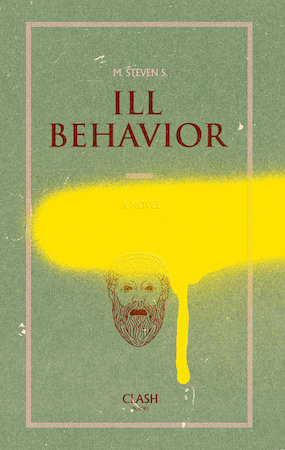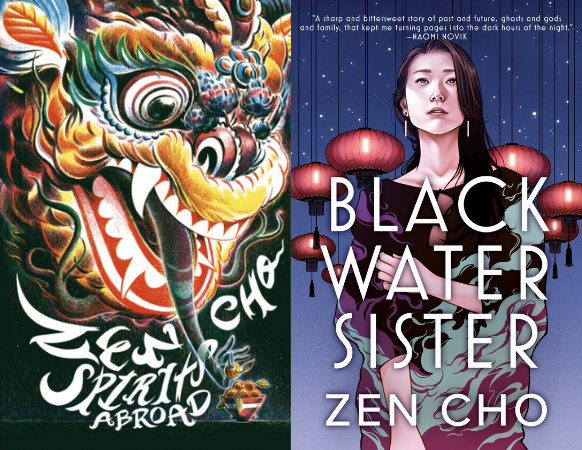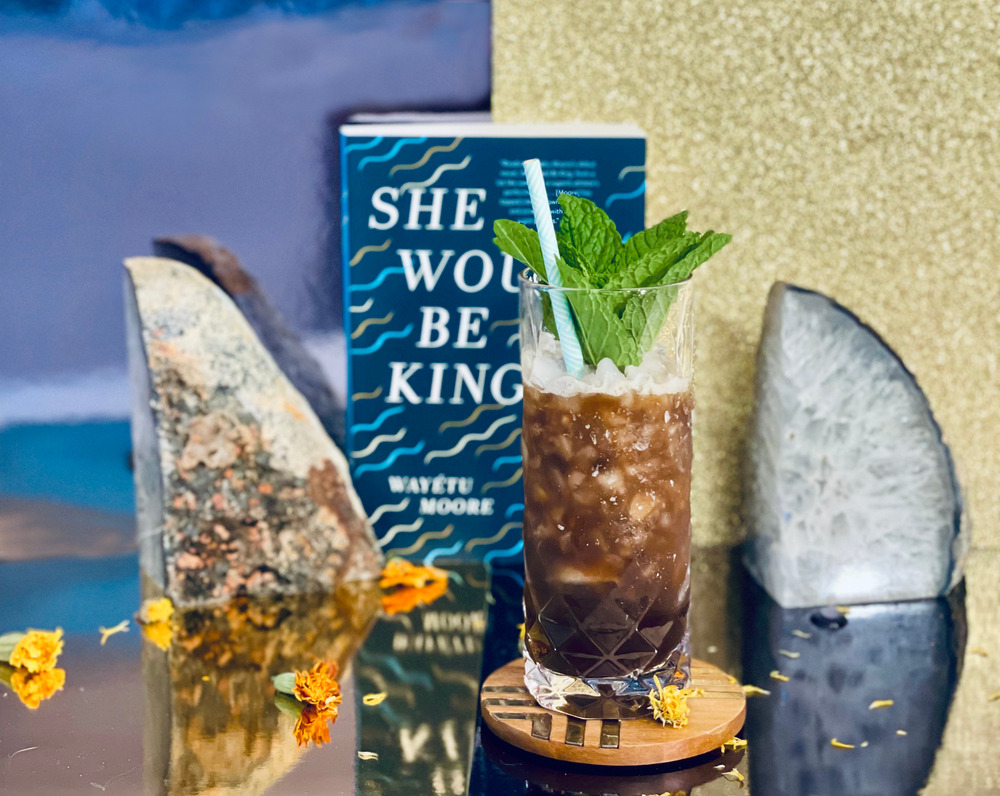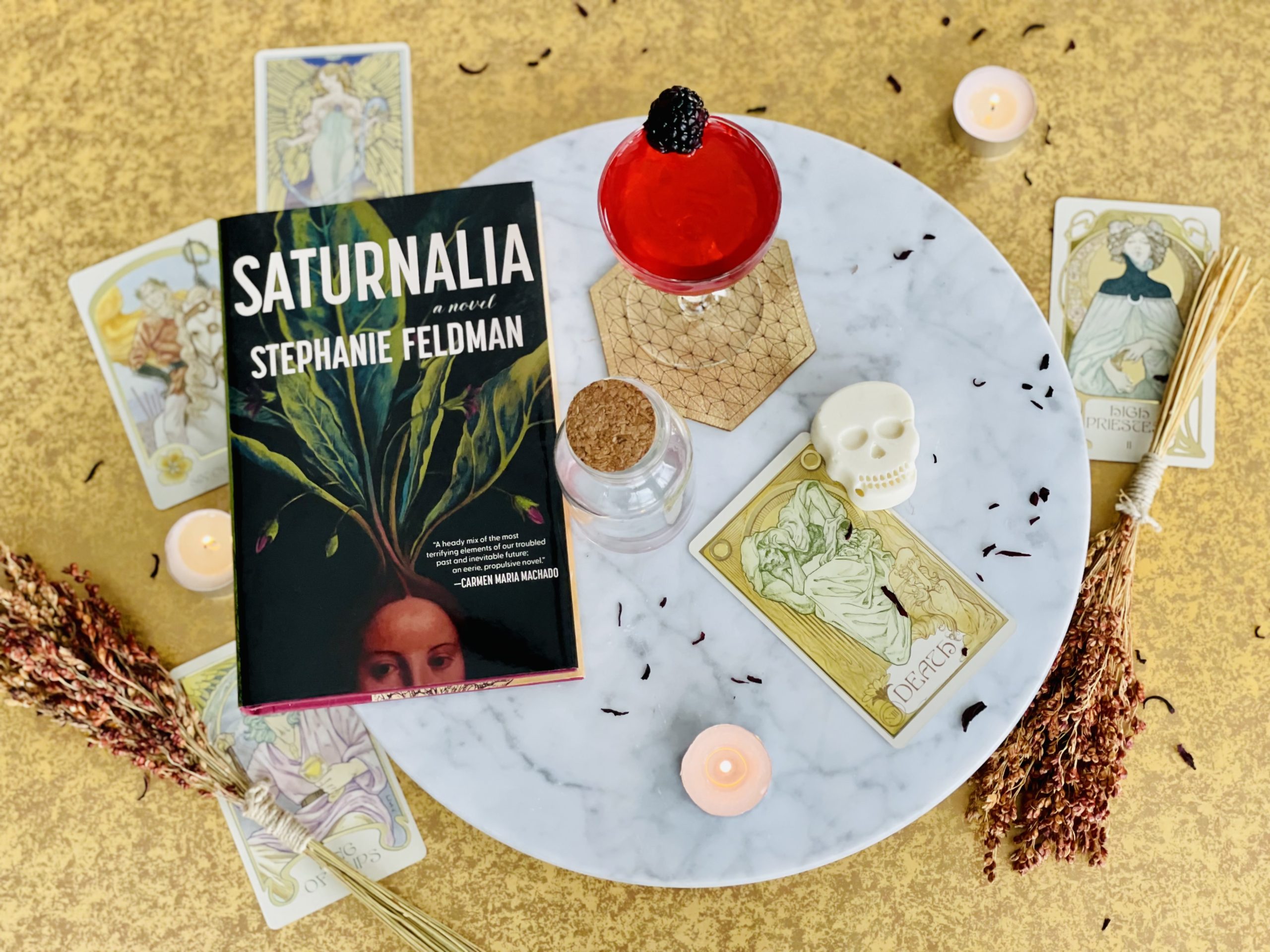Reading Lists
7 Lesser-Known Stoner Novels With Suggested Weed Pairings
M. Steven S., author of "Ill Behavior," recommends books to read while high

“I’ve been lied to my entire life.”
Those were the words running through my head the first time I ever smoked weed. Wait, no … those were the words running through my head the first time I ever got stoned. The first time I ever smoked weed, I didn’t actually get stoned, which I understand is a common occurrence (or is it a common non-occurrence?). But the very next night, while sitting on a patio under a starless sky with a dozen or so friends at a café in Amsterdam, the glow of red lights somewhere nearby, I toked my second joint and almost immediately got stoned. And it was then that I realized that every person who had been imposed upon me as an authority figure during my adolescence had lied to me.
I thought back to the countless pastors who told the youth group at weeknight gatherings that marijuana would lead us down a path of sin and bacchanalian debauchery. Lie. (It wasn’t the weed that did that.)
I thought back to the overly-friendly police officer who visited my 5th-grade class every two weeks and dared us not to smoke pot because it was a “gateway” drug. Lie. (Well-intentioned as it may have been at the time.) He also told us that someone would try to give us weed for free to hook us for life. “The first one’s always free, that’s how they get ya,” he would say. Also a lie. (Nobody ever offered me free weed in middle school.)
I thought back to my somewhat confused high school Health teacher who, as I recall, at one point told us not to “inject” marijuana. (Well, actually, that one’s a truth—don’t do that.)
I thought back to all the times during college when I could have passed the dutchie with friends and enjoyed myself—cut loose a bit—but instead opted to abstain because I had believed all the lies. (I was a late bloomer. Oh well … all’s well that ends well, I suppose.)
What’s the point of this story, you ask? The point is that I needed a brief introduction to the shameless self-promotion of my forthcoming novel before giving you the clickbait you came here for. Now on with the self-promotion!
Twelve or so years after sitting outside that Amsterdam café, as I was writing what would become my debut novel, Ill Behavior, I reflected back on that very first body buzz and, with some inspiration from my 2nd-grade teacher (a story for another time), I memorialized the experience with the following passage:
“He brings the flame to the tip of the pipe and takes a hit to the dome, holding the smoke in his lungs before letting it out slow. Tiny THC soldiers deployed from the cerebellum march on Fort Limbs, conquering flesh and leaving the battlefield euphoric and numb. HQ radios for reinforcements and once more [he] deploys the troops who forge into battle with arrogant gusto, their eyes having seen the glory of the coming of the Lord and that place where the grapes of wrath are stored. Truth marches on. Glory fucking halleluiah.”
Who is the “he” in that passage, you ask? He is SOBR, a notorious Los Angeles graffiti writer who is wanted for a murder he did not commit, and so he sets out to clear his graffiti name of the murder with the help of his friend in the LAPD. You can follow him on his short odyssey now! Ill Behavior is being published by the extraordinary indie lit press CLASH Books, and is currently available for purchase on their website (ClashBooks.com), the Capitalist Rain Forest Website, and other places where books are sold.
And now, the main event! 7 lesser-known stoner novels with suggested pairings (legal states only, please).
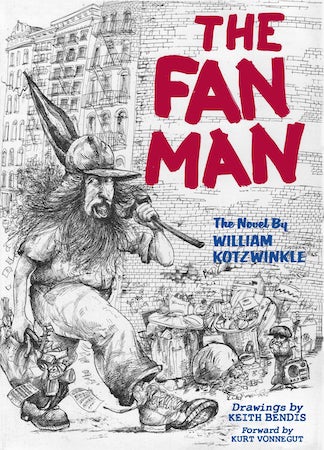
The Fan Man by William Kotzwinkle
This book was given to me by one of the folks in attendance at that Amsterdam café so many years ago, and it was my first foray into the lesser-known counterculture lit of the ‘60s and ‘70s. Nearly everyone reading this list has read Hunter S. Thompson or Thomas Pynchon, Richard Brautigan or Tom Robbins. But have you read Kotzwinkle? I hardly ever hear his name mentioned along with the others, and I never see The Fan Man on lists of this sort.
The story follows Horse Badorties, a befuddled garbage hoarder, on a farcical adventure as he moves from pad to pad and acquires junk on the streets of New York circa 1970. A picaresque in the vein of its famous forebears (e.g., Don Quixote and Candide), the story is not remotely politically correct, nor is it for the faint of heart (or the clean-freaks). But as an installment of Fool’s Literature, is there something we can learn about the mid-20th century from Kotzwinkle’s satire? Honestly, I don’t know—it’s been many years since I first read it, so I’ll have to revisit it again to answer that question. But the reason it’s a stoner novel, man, is due to the unique, sometimes jarring prose in the form of first-person stream-of-consciousness hippie-speak that resides in the mind of Mr. Badorties (who often refers to himself in the third person). It’s a style of writing that pushed the boundaries of literature for its time, and a style that stuck with me ever since I first turned its pages. And as I’ve just discovered that it was re-released in 2015 with an introduction by T.C. Boyle, l will indeed be revisiting this one again very soon. When I do, I’ll be pairing it with something of the indica or indica-dominant variety—Platinum OG or Girl Scout Cookies. And I think you should, too, man. Pack a bowl, take a rip, and enjoy the weird journey of The Fan Man, man.
The Sellout by Paul Beatty
This is certainly not a lesser-known novel, not at all. I mean, it won the Booker Prize (then called the Man Booker Prize) in 2016 for fuck’s sake. However, I like to think of it as a lesser-known stoner novel. Why? Well, for starters, in the prologue (Oh, you skip the prologue? Don’t. Don’t ever do that again.), we meet our protagonist who is standing trial in the United States Supreme Court. As he sits there, waiting for the pomp and circumstance to begin, he takes “the most glorious toke ever taken in the history of pot smoking,” right there on the floor of the U.S. Supreme Court, “getting high in the highest court of the land.”
But it’s not just that this book opens up with an epic indo-indulging scene that makes it a stoner novel. It’s the entire spirit of the book—irreverent, absurd, enlightening. It’s written with the tone and humor that makes for a good stoner comedy flick. It tackles social issues with supersonic satire. And the writing is something special. Nearly each passage has something to chew on, be it the message or the comedy, the word choices or the flow of the sentences. And about that flow… wow! The prose is often rhythmic and urgent—like reading a hip-hop verse, or listening to slam poetry, which makes sense given Beatty’s background (1990 Grand Poetry Slam Champion). And, apparently, this book is not for squares—a quick glance at the reviews on Capitalist Rain Forrest Website will show you that it doesn’t resonate with everyone. I certainly don’t think you have to be a stoner to enjoy The Sellout, but I think most stoners will dig it.
So, go buy this book, then get your hands on a sativa-dominant hybrid. Personally, I’d stuff my pipe with something like Pineapple Express or Jack Herer. Light up starting on the first page (of the prologue!) and let the high-speed writing take you on a memorable ride.
Molloy by Samuel Beckett
I list this book as a stoner novel, but not in the traditional sense. Some of the hallmarks of a stoner novel are certainly present here—a character living on the fringe of society, stream-of-consciousness life-questioning internal monologue, dark/absurdist humor, etc. But what pushes this book into non-traditional stoner novel territory is that the reader might actually need to be stoned to understand it. The plot, if one exists, is vague at best. Many scenes leave the sober mind wondering if a greater meaning, or some obvious symbolism, has been missed (or maybe I’m just dumb as shit). Each page makes you reflect on the author’s intent—in that, was there any intent at all? Maybe, maybe not … I have no clue. Perhaps when Beckett wrote Molloy it was simply an exercise in letting his subconscious flow out onto the page without inhibition—the only intent being that the end result was something avant-garde? Or perhaps meaning abounds within its pages and I was too repressed, too literal in my reading to understand it?
Reasonable minds may disagree on the book’s meaning (or lack of meaning), but two things are certain: 1. Molloy is a work of art, written at the hands of a master of his craft, and 2. as with all art, it can be thoroughly enjoyed (and possibly deciphered) while stoned. To tackle Molloy, which is a tough read, you’re gonna need to be focused and engaged, so we’re going full sativa for this one. Grab some Sour Diesel or Green Crack, load up your vape pen, and suck until you get thoroughly stoned… then maybe you’ll come to understand the stone-sucking sequence in the book (and if you do, please DM me).
The Buddha of Suburbia by Hanif Kureishi
Honestly, I’m not sure if this is such a well-known novel that I need to characterize it as a lesser-known stoner novel. It might be extremely popular (maybe even essential reading) on the other side of the pond and I’m just not aware of it. I mean, it did inspire a BBC series… with a soundtrack by David Bowie… so I have to think it has some presence among the Brits. But I think I can safely say it’s not a popular novel on the Yankee side of the pond… I’ve never seen it on any of these esteemed listicles… and I don’t recall having seen it referenced in any posts in the r/Books subreddit (longtime lurker here). I first picked up The Buddha of Suburbia just a few years ago when I randomly came across it on the shelves of my favorite used bookstore (an autographed copy, to boot!). And boy am I glad I did!
We meet the protagonist, Karim Amir, as a late-teens/early-20s youth growing up in the 1970s suburbs of London and, eventually, the city itself (with a stint in Yankee-town, USA). His Indian father has become something of a mystic guru to the seekers of their boring suburb, which ultimately leads to the breakup of their family and sets Karim on the path to discovering himself.
Throughout Karim’s journey, Kureishi navigates heavy themes—religion, racism, immigration, sexuality, class, identity—with wit and empathy. Reportedly inspired by his own life, Kureishi’s portrait of what it was like for a mixed-race teenager living in 1970s suburban London, written through the lens of the 1980s, unfortunately rings all too familiar in the 2020s (on both sides of the pond, I’m sure). But Kureishi deftly captures that feeling of late-teen/young adulthood angst, and the journey of self-discovery and reinvention, of both the 1970s and the 1980s (and somehow also the 1990s)… which I proclaim in as much as I can imagine being a teen in the 1970s… I wasn’t alive yet (but I’ve seen Almost Famous!)… and I also wasn’t a teen in the 1980s (but I’ve seen all the John Hughes movies!). Maybe it’s just that the teenage/young-adult mode captured by Kureishi was similar for us Westerners raised between the inventions of the television and the smartphone.
This book is hilarious, irreverent, insightful and deliciously subversive—the hallmarks of a great stoner novel. Oh, and very early on in the story, Karim has a grand revelation while using the loo after toking a joint. Ah, and our cast of characters partake of the legendary Thai sticks a few times throughout the story (more on those below). It’s just an added bonus that the title of the book contains a synonym for weed.
I highly recommend you read this book—highly. Pair this one with your favorite edible—dosage of your choosing, but low enough so you don’t get lost on the page. Maybe throw on that Bowie soundtrack in the background, and prepare yourself to be amused by this delightful book that I’m so happy to have stumbled upon.
Steppenwolf by Hermann Hesse
Of all the books on this list, I think Steppenwolf most deserves the “stoner novel” moniker. The protagonist, Harry Haller (yes, you guessed it, a loner in the midst of an existential crisis who wanders around the city pondering life’s questions and his place in society), is contemplating suicide when he encounters a man on the street holding a sign advertising a night of “Anarchist Evening Entertainment” at a magic theater (groovy, baby!). The man gives Harry a treatise that inexplicably seems to be written about Harry’s very life. As the morose, uptight, disillusioned Harry seeks out more information on the magic theater, he meets Hermine, a woman who would ultimately save his life by getting him to loosen up a bit (a lot, actually). Hermine teaches Harry how to dance, introduces him to jazz and casual drug use, and gets him laid. More importantly, she convinces him that each of these conventions is a worthy endeavor in living a fulfilling life—that one must lighten up and not take things so seriously. In other words, “eat, drink and be merry” as someone famous once said (Dave Matthews?). When Harry finally makes it to The Magic Theater (not a spoiler), the ticket proclaims “For Madmen Only—Price of Admittance Your Mind” (hey MedMen, I think you’re missing out on some sort of marketing opportunity here) and that’s when the trippy stuff happens.
This novel was clearly written under the fluorescent light of a lava lamp, inspired by the counterculture movement of the 1960s, right?
Wrong.
Steppenwolf was written in the 1920s. It was the counterculture movement of the 1960s (and beyond) that was inspired by Steppenwolf, and there’s no denying its influence. The Magic Theater Company founded in Berkeley in 1967, and the Steppenwolf Theater Company founded in Chicago in 1974—look them up, you’ll recognize some of the alumni. A book by Osho (I assume you saw that documentary?) entitled “For Madmen Only: Price of Admission, Your Mind” published in 1979. Oh, and the band Steppenwolf formed in 1967—ever heard of ‘em?
Steppenwolf is one of my favorite novels. If you haven’t read it, I hope you’ll consider doing so. If you’ve already read it, I hope you’ll consider reading it again… stoned. Get psychedelic with it. Pull up that MedMen app (guys, I’m trying real hard for you here—call me for other promotional opportunities) and order an eighth of OG Kush, maybe some 707, or LSD by Barney’s Farm. Tip your delivery person well. Then grind up that sticky icky icky, roll it in a blunt and dip it in the kief that’s been sitting at the bottom of your grinder for god-knows-how-long (this is what you’ve been saving it for!). Or, you know, do some dabs… if that’s your thing (it’s not mine).
The Orange Eats Creeps by Grace Krilanovich
Much like Molloy, this novel doesn’t quite fit this list in the traditional sense. It would probably be better suited for a “Top 7 Lesser-Known Tweaker Novels” list, or a list of “What To Read While Sipping Purple Drank”, but I don’t think they let you write those lists (or maybe they do … Buzzfeed, hit me up). However, I’m including it here as a sort of challenge for the daring stoner.
A little bit about the novel: Hobo vampire junkies. That’s all you really need to know. Hobo vampire junkies, who look and smell like crusty gutter punks, roam the Pacific Northwest knocking over pharmacies to score behind-the-counter drugs. To compare it to a few films, think Drugstore Cowboy gives Twilight a Sucker Punch (the asylum scenes, not the fantasy scenes)… and Edward or whoever-the-fuck never shows up to protect you. As I remember it, The Orange Eats Creeps starts off with a fairly normal, linear plotline, but it soon breaks down into the non-linear madness of a drug-addled fever dream where the story has been highjacked and all that remains are the unreliable fragmented thoughts of our teenage narrator who’s lost her grip on reality as she tries to escape the clutches of a serial killer.
Now, you’re probably wondering “Why is this a stoner novel? It doesn’t sound funny. And it doesn’t sound enlightening.”
Well, you’re right… it’s not.
And it’s not.
But it is a trip. And it is a stunning work of literary art… just as Beckett accomplished with Molloy… and others will draw comparisons to William S. Burroughs. With The Orange Eats Creeps, Krilanovich created a surreal experience that’s unique to her voice and worthy of high praise.
Here’s how I think you should treat this book as a stoner novel: Go out and get that strain of weed you absolutely hate because of how paranoid it makes you. If it’s a BOGO at your local dispensary, then you’re in luck! More to enhance the experience! Pack that bong and rip it as you’ve never ripped before. Then do it again. And again. Smoke all that BOGO and get to reading. Let the language sink into you. Let the foreboding sense of doom crawl into your bloodstream. Get lost on the page. Give in to the paranoia and see what comes out on the flip side… if you dare.
Thai Stick: Surfers, Scammers, and the Untold History of the Marijuana Trade by Peter Maguire and Mike Ritter
OK, so this is a non-fiction book, not a novel. Sue me. If you’re reading this online, it’s literally free for you to read, and if you’re reading it in print (omg, I’m in print?!) then you’re probably sitting in the lobby of your doctor’s office and you didn’t pay for this magazine/journal anyway. [Editor’s note: Electric Literature ended our print run a decade ago, so you will not be perusing our stories at your local dentist’s chair.]
As responsible, conscientious stoners, I think it’s important for us to be aware of the history of the marijuana trade. The authors of Thai Stick have stitched together an incredible history of the Southern California/Southeast Asia pot trade of the ‘60s and ‘70s, which was largely carried out by globetrotting surfers and fearless watermen. For those who don’t know (I didn’t), a Thai stick was a popular form of weed packaging for shipment and distribution out of Thailand—buds were skewered on bamboo sticks and wrapped tightly with a stringy fiber from the plant (sort of like weed kebabs).
Primarily based on oral histories, this book is as fantastical as any fictional stoner novel. It’s an adventure on the high seas like you couldn’t imagine, and an eye-opening portrait of the SoCal drug culture, particularly that of my birthplace, Orange County, California (apparently the OC wasn’t always just religious teetotalers … who knew?). Fair warning: A harrowing and sobering story about an encounter with the Khmer Rouge, replete with eerie photo evidence, will haunt you. But don’t fear, good times abound within. As with any good gangster story, you’ll root for the guys doing the crimes and you’ll bemoan their failures and ultimate capture. And when I first read the introduction to Thai Stick (introductions are like prologues—read them!), I felt like Peter Maguire had been channeling The Good Doctor himself when he wrote it. That alone was worth the price of admission, but it also set the tone for a riveting and, I dare say, important read. We must know our history and pay homage to those hidden heroes who helped shape an entire generation—those surfers in search of endless summers who happened upon the untamed business of pot to finance their utopian dream.
And what should you pair this book with? Nothing. Read it stone-cold sober … out of respect for those who paved the way for you to get stoned today, many of them casualties in the futile, senseless, never-ending War on Drugs.
Just kidding. They wouldn’t want that.
Pick your favorite bud, or grab whatever flower you happen to have at the moment, and toke up! As for me, I’m going in search of that very first body buzz I experienced while sitting outside a café in Amsterdam. I think it was Great White Shark … I can’t be certain, but I’ll soon find out.
Stoner by John Williams
Just kidding!




